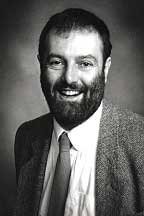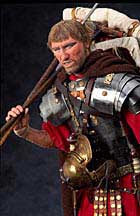email: gdw2@st-andrews.ac.uk
phone 01334 462608
 A graduate of Oxford and Cambridge, Professor Woolf returned to Oxford in 1990 to teach ancient history and archaeology as a fellow of first Magdalen and then Brasenose Colleges before being elected in 1998 to a chair of ancient history at St. Andrews where he is currently Head of the School of Classics.
A graduate of Oxford and Cambridge, Professor Woolf returned to Oxford in 1990 to teach ancient history and archaeology as a fellow of first Magdalen and then Brasenose Colleges before being elected in 1998 to a chair of ancient history at St. Andrews where he is currently Head of the School of Classics.I am a member of the Advisory Board of the American Journal of Archaeology.
I have served on the Councils of the Roman Society and the Classical Association and currently sit on the Editorial Boards of both societies. I am a member of the Advisory committees of the Roman Society and of the LTSN subject centre in Classics and have served as an AHRB panellist. I am a member of the American Philological Association, of the Classical Association of Scotland and a Fellow of the Society of Antiquaries of Scotland. I have been an external examiner for undergraduate degrees at Strawberry Hill (Classics), UCL (History), the Open University (Classics), Bristol (Classics) and Sheffield (Archaeology); for taught postgraduate degrees in London; and for doctorates in the Universities of Cambridge, Durham, London, Oxford, Reading, Southampton and Wales. I have contributed to the Cambridge Ancient History and the APA (Barrington) Classical Atlas, and the Neue Pauly. During 2004 I was an Honorary Research Fellow of the British School at Rome.
Research Interests
The cultural history of the Roman empire. My past work has included studies of patronage, of epigraphy as a cultural phenomenon, of literacy and of the economic history of the empire and its urbanization. A major focus of my research has been on the archaeology and history of Roman Gaul, especially the cultural changes usually termed Romanization. I have carried out fieldwork in northern France. I maintain interests in the later prehistory of Europe, in archaeological theory, and in the Younger Pliny. More recently I have been engaged in the study of religious practice in the Roman provinces."
Recent Publications
Regional Productions in early Roman Gaul, in D. Mattingly and J. Salmon (eds.) Economies beyond Agriculture in the classical world (London, 2000), 49-65
The Roman Cultural Revolution in Gaul, in S. Keay and N. Terrenato eds. Italy and the West. Comparative Issues in Romanization, (Oxford, 2001), 173-86.
Inventing empire in ancient Rome, in Empires. Perspectives from archaeology and history edited by S.E.Alcock, T.N.DÕAltroy, K. D. Morrisson and C. M. Sinopoli, Cambridge University Press, Cambridge 2001, 311-22
Representation as Cult: the case of the Jupiter columns, in Spickermann, W., Cancik, H. and Rüpke, J. (eds.), Religion in den germanischen Provinzen Roms, Tübingen 2001, 117-34.
Generations of Aristocracy. Continuities and discontinuities in the societies of Interior Gaul. Archaeological Dialogues 9.1 (2002) 2-15 with discussion 39-65
Afterword: How the Latin West was won, in A.Cooley (ed.) Writing Latin, Becoming Roman, JRA supplementary volume 48 (2002) 181-88
Rome the Cosmopolis Cambridge University Press, Cambridge (2003) edited with Catharine Edwards
Seeing Apollo in Roman Gaul and Germany, in S.Scott and J.Webster (eds.) Roman Imperialism and Provincial Art (Cambridge 2003) 139-152
Cambridge Illustrated History of the RomanWorld (consultant editor, and contributor of three chapters) Cambridge University Press, Cambridge (2003)
A Sea of faith? Mediterranean Historical Review 18.2 (2004) special issue on ?Mediterranean Paradigms and Classical Antiquity? ed. I. Malkin, 126-143
Local Cult in Imperial Context: the Matronae revisited, in P.Noelke ed. Romanisation und Resistenz in Plastik, Architektur und Inschriften der Provinzen des Imperium Romanum. Neue Funde und Forschungen, Akten des VII. Internationalen Colloquiums über Probleme des Provinzialrömischen Kunstschaffens, Köln 2-6 mai 2001, (2004)131-8
"The present state and future scope of Roman Archaeology: a comment" American Journal of Archaeology 108.3 (2004) 417-28
Current Research Projects
At present, Professor Woolf is writing a cultural history of Roman imperialism and a study of the assassination of Julius Caesar and its implications. He is also preparing the 2005 Rhind lectures on Religious Creativity in the Roman Provinces and, together with Dr. Jason Koenig and Prof. Harry Hine, am developing a project on Science and Empire in the Roman World in the context of the Logos Research Centre.




